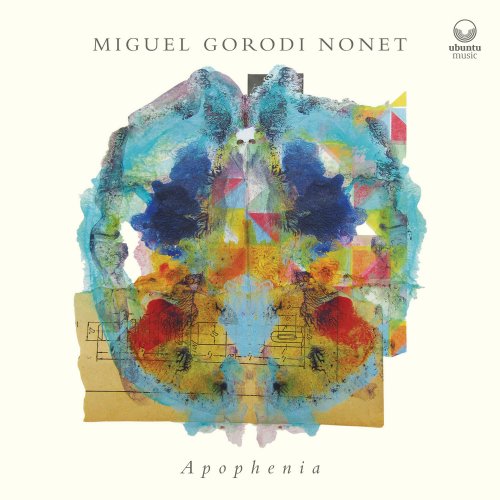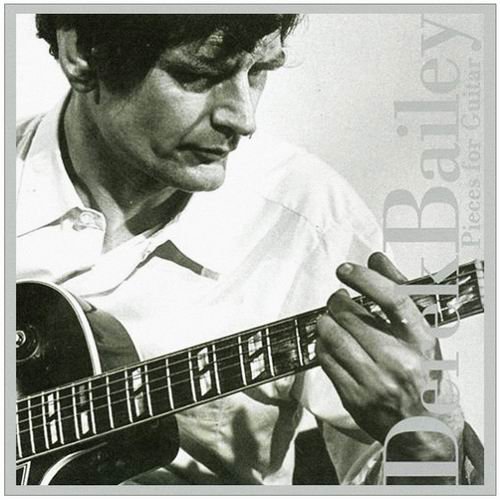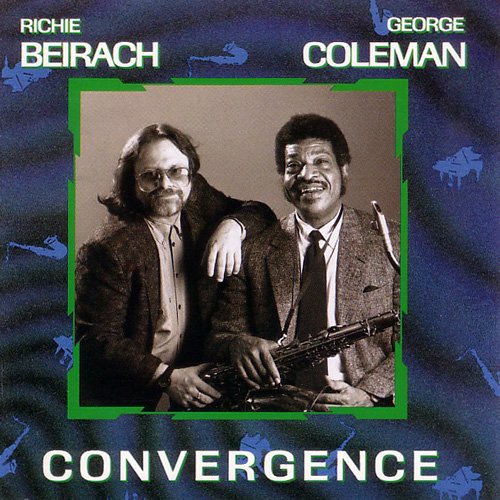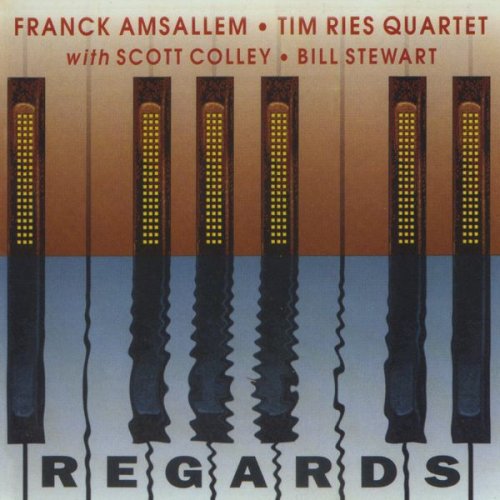Miguel Gorodi Nonet - Apophenia (2019) [Hi-Res]

Artist: Miguel Gorodi Nonet
Title: Apophenia
Year Of Release: 2019
Label: Ubuntu Music
Genre: Jazz
Quality: 24-bit/96kHz FLAC
Total Time: 52:50
Total Size: 1011 MB
WebSite: Album Preview
Miguel Gorodi is a Spanish born trumpeter and composer who is now based in London following his studies at the Guildhall School of Music and Drama.Title: Apophenia
Year Of Release: 2019
Label: Ubuntu Music
Genre: Jazz
Quality: 24-bit/96kHz FLAC
Total Time: 52:50
Total Size: 1011 MB
WebSite: Album Preview
He is a hugely versatile musician and I have previously encountered his playing in a sideman context in such large ensembles as the Patchwork Jazz Orchestra, Andrew Linham Jazz Orchestra and the Sam Leak Big Band.
Currently Gorodi is a member of pianist Barry Green’s sextet, saxophonist Cassie Kinoshi’s SEED Ensemble, the London City Big Band, the London Jazz Orchestra and the contemporary trad revivalists the Dixie Ticklers. He has also worked with the vocalists Ian Shaw and Lauren Bush.
He also co-leads a duo with drummer Dave Ingamells and a quartet with alto saxophonist Sam Braysher.
It all makes for a busy musical life but Gorodi also finds time to lead the excellent nonet that appears on this exceptional début recording. Nothing that I’d heard from Gorodi’s work as a sideman prepared me for the quality of this album. In terms of both writing and playing it represents a real eye opener.
The nine piece group that Gorodi has assembled for this recording features some of the UK’s leading jazz musicians and lines up as follows;
Miguel Gorodi – trumpet & flugelhorn
Gareth Lockrane – flutes
Michael Chillingworth – alto sax & clarinet
George Crowley – tenor sax & bass clarinet
Kieran McLeod – trombone
Ray Hearne – tuba
Ralph Wyld – vibraphone
Conor Chaplin – double bass
Dave Hamblett – drums
The album is produced by vibraphonist/drummer/pianist Jim Hart, who approaches Gorodi’s often complex writing with a musician’s ear and helps to bring out the warmth, colour and richness of the music.
As a writer Gorodi is influenced by jazz composers such as Steve Coleman, Steve Lehman, Tyshawn Sorey, Thelonious Monk and Wayne Shorter. From the classical sphere he cites Louis Andriessen, Gerard Grisey, Per Norgard and Igor Stravinsky.
For those confused by the album title (as I was) Gorodi’s liner notes shed valuable light on the concepts behind the music. He explains;
“Apophenia can be defined as the perception of meaning or patterns between unrelated, random things. Although Klaus Conrad originally coined the term in reference to schizophrenia or paranoia, it is also considered a normal human experience resulting from the evolution of our brains. Pattern recognition helps us to identify faces, for example, and to decipher language or music from noise. I have also become fascinated by how apophenia, a process of meaning making, fits into the existentialist idea that life has no objective meaning, purpose or intrinsic value, and that we must create our own. I believe that engaging with art is a means to practice meaning making, and is therefore helpful in fostering a fulfilling life”.
In the press release accompanying my copy of the album he also adds;
“Through my music I’ve tried to communicate my experiences with OCD and depression, my thoughts on how to create meaning and purpose in life, and my concerns about the limitations our psychology and biology may have on determining what is meaningful to us”.
Well, you learn something new every day, and all this is pretty heavy stuff – but if you’re reading this please don’t let the seriousness of the concept put you off listening to what is some pretty amazing and wonderful music.
The album begins with “La Nausee”, inspired by the Jean-Paul Sartre novel “Nausea”, a Sartre quote also appears on the album packaging. Gorodi says of his composition;
“This piece grew out of a very simple idea that is manipulated over and over, resulting in the kind of disorientation Sartre’s protagonist experiences when he suffers attacks of ‘nausea’. I interpreted these as maddening panic attacks brought on by depressing ruminations of meaninglessness”.
The music commences with mesmerising swirls of brass and reeds, seemingly swimming in and out of focus, as if to illustrate Gorodi’s precept. The combination of counterpoint and colourful texture is consistently fascinating and is given additional heft by the subsequent addition of the rhythm section. More conventional soloing comes courtesy of the leader on trumpet, who performs fluently and incisively. He’s followed by the impressive Chillingworth, who displays similar qualities.
“Time Sigmund” is informed by Per Norgard’s ‘infinity series’, which Gorodi describes as “a never ending self perpetuating sequence of numbers that creates a fractal pattern, which balances familiarity with novelty”. Another intriguing composition this features darting, circling, percolating motifs around which individual musicians can improvise. The ensemble passages are reminiscent of Steve Reich style minimalism and one is also reminded of drummer/composer John Hollenbeck’s Claudia Quintet. Bassist Chaplin is the first featured soloist here, followed by Lockrane on flute and Crowley on tenor, with Hamblett also enjoying something of a drum feature in the closing stages as he duels with the staccato blasting of the horns.
The sound of Wyld’s unaccompanied vibes introduces “Search”, initially a more pastoral offering featuring warmly textured reeds and brass but which shades off into a freer central section in which both drums and bass are prominent alongside the now squalling horns. Wyld takes a more orthodox vibes solo within the context of a typically inventive Gorodi arrangement before the piece ends as it began with the sound of solo vibes.
“Amygdala Intro” is a freely structured passage featuring duelling brass and reeds, culminating in the motif that launches “Amygdala” itself which features a punchy, fan-faring arrangement with flautist Lockrane emerging as the featured soloist. Apparently the title refers to the area of the brain responsible for emotions.
I seem to remember “Soma” as being the sedative featured in the Aldous Huxley novel “Brave New World”. Gorodi’s composition of the same name is a tightly arranged ensemble piece that includes solos from the leader on flugel and McLeod on trombone, plus a further feature for the consistently impressive Hamblett.
“Fifths” is another piece of accomplished ensemble writing with the nonet capably negotiating the complexities of the score while Gorodi impresses with the quality of his warm, supple and fluent flugel soloing. Crowley’s burly tenor then adds a little more grit to the oyster.
Producer Hart also adds to the liner notes and his comments with regard to Gorodi’s writing and playing are highly illuminating as he states;
“The playing by the ensemble is superb. It is very difficult music to play but it is delivered in a way which is engaging, playful and full of life. Miguel’s tone on the trumpet and flugelhorn is rich and warm, but it cuts too, and his style combines cool pacing with fiery, attacking lines and intervallic leaps which call to mind many of the trumpet greats throughout the history of jazz. But this is contemporary music coming from someone who has a lot to say and is very much worth listening to.”
Hart also praises Gorodi for his talent and ambition and for the way he brings together “some very heavy influences”.
On then with the music and “Two Trees”, another composition that reinforces Hart’s observations. Rhythmically complex but flawlessly played and never ‘difficult’ the piece features a rousing solo from trombonist McLeod and an equally incisive contribution from Chillingworth within the context of another richly inventive arrangement. Gorodi’s compositions and arrangements have earned comparisons with big band composers such as Gil Evans, Mike Gibbs and George Russell and rightly so, the sound generated by the nonet often sounds bigger than just nine instruments.
Hamblett’s drums introduce the closing “Not Nicest Memo” which maintains the high standards set by the rest of the album. Vibraphonist Wyld is let off the leash to deliver a dazzling, free flowing solo which, is answered by the crisp attack of the leader’s trumpet solo as he too kicks over the traces, encouraged by a stinging bass and drum groove. There’s more terrific ensemble playing too plus something of a feature for Lockrane on flute as this exceptional début album finishes on an energetic, upbeat note.
Gorodi’s music isn’t always easy to describe but it is a constant joy to listen to. Skilled, consistently interesting and colourful compositions and arrangements are combined with some exceptional playing, both individually and collectively, to produce music that both fascinates and excites.
Despite the weightiness of some of the philosophical ideas behind it this is music that is never wilfully ‘difficult’ and its artful blending of jazz with various contemporary classical elements should appeal to a broad array of listeners.
Gorodi and the nonet are well served by the production team of Hart and engineers Alex Bonney and Tyler McDiarmid who ensure that each individual musician is heard at his best, whether as a soloist or as part of a very well balanced ensemble.
Gorodi has produced an exceptional début recording. Let’s hope that it attracts the critical and public reaction that it deserves.
01. Miguel Gorodi Nonet - La Nausée (6:24)
02. Miguel Gorodi Nonet - Time Sigmund (8:09)
03. Miguel Gorodi Nonet - Search (7:06)
04. Miguel Gorodi Nonet - Amygdala Intro (1:45)
05. Miguel Gorodi Nonet - Amygdala (4:18)
06. Miguel Gorodi Nonet - Soma (5:44)
07. Miguel Gorodi Nonet - Fifths (5:49)
08. Miguel Gorodi Nonet - Two Trees (5:23)
09. Miguel Gorodi Nonet - Not Nicest Memo (8:12)
![Vesna Pisarovic - Poravna (2025) [Hi-Res] Vesna Pisarovic - Poravna (2025) [Hi-Res]](https://www.dibpic.com/uploads/posts/2026-02/1770024886_xcr9mudmw50b1it2dr9qpqkv0.jpg)

![Palle Mikkelborg - Light (2026) [Hi-Res] Palle Mikkelborg - Light (2026) [Hi-Res]](https://www.dibpic.com/uploads/posts/2026-01/1769762532_sqmvrtmcku1ma_600.jpg)
![Sepalot - closer (2026) [Hi-Res] Sepalot - closer (2026) [Hi-Res]](https://img.israbox.com/img/2026-01/30/tbtrw8vul7fg4oun5l1msn4co.jpg)
![Heisenberg Uncertainty Players - Return to the Enchanted Forest (2026) [Hi-Res] Heisenberg Uncertainty Players - Return to the Enchanted Forest (2026) [Hi-Res]](https://img.israbox.com/img/2026-01/31/tgq378zpwy9e3lh1p4simyihf.jpg)

![Galliano - Unreliable Memories Of Contested Conversations (2026) [Hi-Res] Galliano - Unreliable Memories Of Contested Conversations (2026) [Hi-Res]](https://www.dibpic.com/uploads/posts/2026-01/1769761649_bch472vhc4xxi_600.jpg)
![Rahsaan Roland Kirk - Now Please Don't You Cry, Beautiful Edith (2025 Remaster) (2026) [Hi-Res] Rahsaan Roland Kirk - Now Please Don't You Cry, Beautiful Edith (2025 Remaster) (2026) [Hi-Res]](https://www.dibpic.com/uploads/posts/2026-01/1769782162_cover.jpg)
